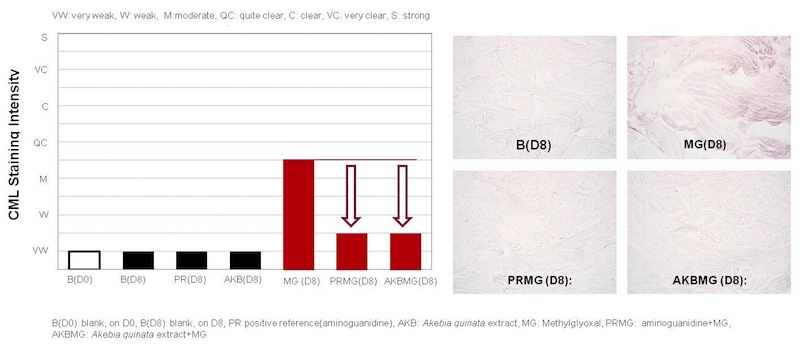Glycation, Skin Aging and AkebiSol
Glycation (non-enzymatic glycosylation) is the result of typically covalent bonding of a protein or lipid with a sugar molecule. Proteins such as collagen and elastin can get damaged by reducing sugars under harsh conditions – UV ray, pollutants, stress and smoking. This process leads to the formation of advanced glycation end products, also called AGEs (Figure 1), which starts to build up when we get aged. The accumulated AGEs eventually lead to a gradual stiffening and loss of firmness and elasticity of the skin. The process of glycation can’t be completely stopped. However, it can be slowed down to maintain younger-looking skin.
AkebiSol is the cosmetic ingredient developed to help maintain younger-healthy skin by inhibiting the accumulation of AGEs. AkebiSol comes from the fruit of Akebia quinata, also known as chocolate vine or five-leaf akebia, native to Japan, China and Korea. Akebia quinata has been nominated as one of the representative native plants of Korea for commemoration of Barcelona Olympic in 1992.
Ex-vivo Study: Inhibitory effect of Akebisol on AGEs formation.
Anti-glycation activity of AkebiSol was evaluated by using human skin explants. The glycation activity was determined by the observation of the general morphology of dermis and epidermis structures as well as CML immunostaining (by Bio-EC, France). Carboxymethylysin (CML) is one of the advanced glycation end-products (AGEs) which is generally used as a marker of glycation. The results demonstrated that AkebiSol decreased the level of methylglyoxal (MG)-induced CML formation (Figure 2).

Figure 2.Inhibitory effects of Akebisol on AGEs formation.
Clinical Study: Anti-Wrinkle effect of AkebiSol
The clinical studies indicated that AkebiSol is considered that it helps improve skin wrinkle on human skin (by DermaPro Skin Research Center, Korea). 17 healthy subjects (average age: 47.47±3.32yr) used a formula containing 1% AkebiSol for 8 weeks. The result showed that AkebiSol has effect to reduce wrinkles around crow’s feet region (Figure 3).

Figure 3. Anti-Wrinkle effects of Akebisol
Practical Hint:
| PRODUCT NAME | AkebiSol |
|---|---|
| INCI NAME | Glycerin (and) Water (and) Akebia Quinata Extract |
| COSMETICS USES | AkebiSol provides skin anti-aging function through anti-glycation. AkebiSol is especially effective to protect young skin by inhibiting the accumulation of advanced glycation end products (AGEs) |
| USE LEVEL | Usage levels may vary from 1% to 5%, depending on the formulation. (Recommended dosage - 1%) |
| FORMULATION GUIDELINE | Do not add when the formulation temperature is higher than 55°C. In the last step, cool the formulation temperature to lower than 55°C and then add to the formulation. |
| STORAGE & SHELF LIFE | AkebiSol should be stored in the original container protected from light in a clean place at a room temperature and normal dry condition. If stored under the recommended conditions, AkebiSol remains stable for at least 3 years. |
| SPECIFICATION |
Appearance ~ Slightly yellow liquid Odor ~ Characteristics Solubility ~ Water-soluble pH ~ 4.00 ~ 7.00 at 25°C Specific Gravity ~ 1.10 ~ 1.30 at 25°C |
AkebiSol is a cosmetic ingredient specifically designed for anti-aging effect. It can be used in various types of cosmetic applications. For more information, please contact us via info@biospectrum.com.
